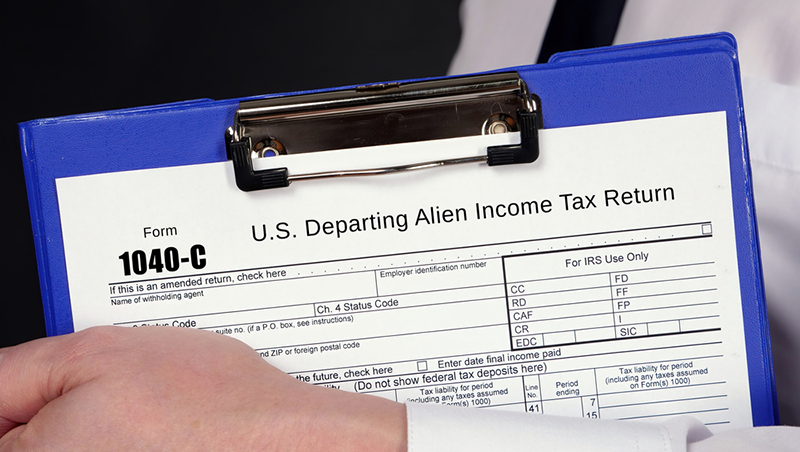Subpart F Income Tax Planning for U.S. Shareholders of Foreign Corporations
In today’s increasingly globalized business environment, U.S. investors and companies often hold ownership stakes in foreign corporations. The...
As the owner of a foreign corporation with U.S. business activities, you have specific tax filing obligations in the United States. One of these obligations is to file Form 1120-F, which is your foreign corporation's U.S. income tax return.
Form 1120-F is the form used by foreign corporations to file their US income tax returns. Foreign corporations use Form 1120-F to report their U.S. income, gains, losses, deductions, credits, and to figure their U.S. income tax liability.
A U.S. or domestic corporation is one that was created or organized in the United States or under the laws of the United States, any of its states, or the District of Columbia. In general, a foreign corporation is one that does not fit the definition of a domestic corporation. A foreign corporation is one that was organized outside the United States. Not to be confused with a controlled foreign corporation. A U.S. corporation files Form 1120 and a foreign corporation files Form 1120-F. U.S. corporations pay taxes on their worldwide income while foreign corporations pay taxes on their U.S. income or effectively connected income. Controlled foreign corporations require another form.

A foreign corporation that is engaged in a U.S. trade or business at any time during the year must file a U.S. tax return. Foreign corporations are required to pay taxes on U.S. source income and effectively connected income on their U.S. trade. By filing their U.S. income tax return, shareholders of foreign corporations ensure their compliance with the U.S. tax laws avoiding any tax penalties.
A foreign corporation that is engaged in a U.S. trade or business at any time during the year must file a return on Form 1120-F. The return is required even if the foreign corporation had no effectively connected income or the effectively connected income was exempt from U.S. tax under a tax treaty. Unless one of the exceptions below applies, a foreign corporation must file a U.S. income tax return, Form 1120-F if, during the tax year, the corporation:
Was engaged in a trade or business in the United States, whether or not it had U.S. source income from that trade or business, and whether or not income from such trade or business is exempt from U.S. tax under a tax treaty.;
Had income, gains, or losses treated as if they were effectively connected with the conduct of a U.S. trade or business; or
Was not engaged in a trade or business in the United States, but had U.S. source income, if its tax liability has not been fully satisfied by withholding of tax at source; or
A foreign corporation making a claim for the refund of an overpayment of tax for the tax year; or
A foreign corporation claiming the benefit of any deductions or credits.
A foreign corporation making a claim that an income treaty overruled or modified any provision of the Internal Revenue Code with respect to income derived by the foreign corporation at any time during the tax year, and such position is required to be disclosed on Form 8833.
Tax Tips: Foreign corporations can not file a consolidated income tax return in the U.S. even if the foreign corporations are part of a group of foreign corporations operating in the United States.

Being engaged in a trade or business in the U.S. is not clearly defined in the code or regulations and it is therefore a facts and circumstance test. The reason being the following. Generally, engaged in a trade or business in the U.S. will exist when a foreign corporation engages in an active and continuous business in the U.S. in order to generate a profit. If a foreign corporation owns and operates a business in the United States selling inventory, the foreign corporation is most likely engaged in a trade or business. Also, Section 864(b) states that a trade or business within the United States includes the performance of personal services within the U.S. at any time during the year.
Tax Tips: Trading in stocks, securities, commodities, though a broker, or independent agent or on the foreign person's or employee or own account is excluded by the code as being engaged in a trade or business in the U.S.
Tax Tips: FIRPTA provides that gain or loss from the sale of U.S. real estate shall be considered as if the foreign corporation was engaged in a U.S. trade or business and the income from the real estate activity is considered effectively connected.
Yes, income effectively connected with the conduct of a U.S. trade or business is subject to U.S. tax and must be reported on Form 1120-F. Income not effectively connected with the conduct of a U.S. trade or business is also subject to U.S. tax and must be reported on Form 1120-F. This includes income from royalties, interest, dividends, rents, premiums or annuities derived from sources within the United States. Such items are usually called "fixed" or "determinable, annual or periodic" (FDAP) income. Income from the sale of real property located in the United States is also subject to US tax and must be reported on Form 1120-F. In addition, income from gains realized by foreign corporations resulting from the disposition of property used or held for use in a U.S. trade or business also must be reported on Form 1120-F. Income generated outside the U.S. or non U.S. sourced income is not taxable in the U.S.
Tax Tips: A foreign corporation may be able to lower its U.S. income tax liability, by taking advantage of the provisions in any applicable income tax treaty between the United States and the country where it is incorporated. If the foreign corporation believes it qualifies for such a benefit, it must attach form 8833 (Treaty-Based Return Position Disclosure Under Section 6114 or 7701(b)) to its U.S. income tax return.
Foreign corporations can be considered engaged in a U.S. commercial activity if they are based on U.S. business operations, have workers, or have others in the United States. The branch office can comprise all unincorporated U.S. corporations and joint venture companies. A foreign company having its branch office in the States may also pay tax to the branch profit for profits that are returned to its home country.
Subpart F income is a type of income that is earned by a controlled foreign corporation (CFC) and is subject to U.S. taxation, even if it is not repatriated to the United States. The term "Subpart F" refers to the part of the U.S. tax code that covers this type of income. Subpart F income is a type of income that must be reported. Foreign corporations that have Subpart F income must include it on their Form 1120-F and pay U.S. income tax on that income.
An authorized officer of the corporation must sign and date the tax return. The tax return must be signed and dated by: the president, vice president, treasurer, assistant treasurer, chief accounting officer; or any other corporate officer (such as tax officer) authorized to sign. If a tax return is filed on behalf of a corporation by a receiver, trustee, or assignee, the fiduciary must sign the return, instead of the corporate officer.
Generally, a corporation must file its income tax return by the 15th day of the 4th month after the end of its tax year. A new corporation filing a short-period return must generally file by the 15th day of the 4th month after the short period ends. A corporation that has dissolved must generally file by the 15th day of the 4th month after the date it dissolved.
The foreign corporation will be charged interest for filing or paying late and a monthly late-filing penalty of 5 percent of the outstanding tax for up to five months.
Interest. Interest is charged on taxes paid late even if an extension of time to file is granted. Interest is also charged on penalties imposed for failure to file, negligence, fraud, substantial valuation misstatements, substantial understatements of tax, and reportable transaction understatements from the due date (including extensions) to the date of payment.
Late filing of return. A corporation that does not file its tax return on time, including extensions, may be penalized 5% of the unpaid tax for each month or part of a month the return is late, up to a maximum of 25% of the unpaid tax.
Tips: If the foreign corporation receives a notice about penalties after it files its return, you should send the IRS a reasonable cause explanation and the IRS will determine if the corporation meets reasonable-cause criteria.
A foreign corporation does not have to file Form 1120-F if neither the foreign corporation nor any of its branches was a qualified derivatives dealer and any of the following rules apply.
It did not engage in a U.S. trade or business during the year, and its full U.S. tax was withheld at source.
Its only U.S. source income is exempt from U.S. taxation under section 881(c) or (d).
It is a beneficiary of an estate or trust engaged in a U.S. trade or business, but would itself otherwise not need to file.
Tips: Even if a foreign corporation has no gross income for the tax year because it is claiming a treaty or Code exemption, it must still file Form 1120-F to show that the income was exempted by treaty or Code.
A foreign corporation protective tax return is an income tax return filed with the IRS to protect a position taken by the corporation. A foreign corporation that engages in limited activities in the U.S. trade and that it determines it does not have effectively connected income may nonetheless file a protective income tax return to receive the benefits of the credits and deductions if it is later determined by the government that the original determination is incorrect. The protective filing must be timely filed under Reg. §1.882-4(a)(3)(i) . Taxpayers filing protective returns under this provision may make Reg. §1.882-5 protective elections. If the corporation does not file the protective return, the foreign corporations will have to pay taxes on the income of this activity but will not have the right to deduct the expenses if the IRS makes the determination that the income from the activity is ECI. A protective filing does not hurt the taxpayers position. We recommend that you file a protective filing if necessary.
Tax Tips: We recommend that foreign corporations file protective returns for all U.S. activities to safeguard its rights to receive the credits and deductions related to those activities. Since the determination as respect to whether a foreign corporation is engaged in a U.S. trade or business is not clear, it is good practice to file protective returns to minimize any potential tax liability.
You should keep the corporation's records for as long as they may be needed for the administration of any provision of the Internal Revenue Code. Usually, records that support an item of income, deduction, or credit on the return must be kept for 3 years from the date the return is due or filed, whichever is later. We recommend to keep all your records for a minimum of 7 years.
Foreign corporations must make installment payments of estimated tax if it expects its total income tax for the year to be $500 or more. The installment payments are due by the 15th day of the 4th, 6th, 9th, and 12th month of the tax year. If any date falls on a Saturday, Sunday, or legal holiday, the installment is due on the next regular business day.
Form 1120 can be filed online or by mail. Foreign corporations can generally electronically file (e-file) Form 1120-F, related forms, schedules, and attachments; Form 7004 (automatic extension of time to file); and employment tax returns. If there is a balance due, the corporation can authorize an electronic funds withdrawal while e-filing. If you cannot file Form 1120-F electronically, then send Form 1120-F via mail to the Internal Revenue Service Center, P.O. Box 409101, Ogden, UT 84409. Remember to always file your income tax returns on time to avoid any penalties.
The corporation must file Form 7004, Application for Automatic Extension of Time To File Certain Business Income Tax, Information, and Other Returns, by the return due date specified in the previous two paragraphs to request an extension of time to file. A foreign corporation that does not maintain an office or place of business in the United States must generally file Form 1120-F by the 15th day of the 6th month after the end of its tax year. File Form 7004 by the 15th day of the sixth month after the end of the tax year to request an extension of time to file. This six month extension is granted automatically by just filing the form. See the Instructions for Form 7004 for additional information on filing a six month extension.
A corporation must figure its taxable income on the basis of a tax year. A tax year is the annual accounting period a corporation uses to keep its records and report its U.S. source income and expenses. Generally, corporations may use a calendar year or a fiscal year. Once you adopt your accounting period by filing your initial income tax return, you must get a consent of the IRS before changing the adopted tax year by filing Form 1128, Application To Adopt, Change, or Retain a Tax Year.
In computing the taxable income of a foreign corporation engaged in a U.S. trade or business, deductions are allowed only if they are connected with income effectively connected with the conduct of a trade or business in the United States. You should also be aware that there may be credits for foreign corporations that can be deducted:
Compensation of Officers
Salaries and Wages
Repairs and Maintenance
Bad Debts
Rents
Taxes and Licenses
Interest Expense
Charitable Contributions
Depreciation
Depletion
Pension, Profit-Sharing, etc., Plans
Employee Benefit Programs
Other Deductions - Businesses can deduct expenses that are ordinary and necessary
Form 1120-F provides specific instructions for calculating the taxable income of a foreign corporation. Generally, when calculating your taxable income, you must:
1. Compute your U.S. gross income and U.S. gross receipts
2. Determine which expenses are deductible from U.S. gross income
3. Subtract any losses that occurred during the tax year
4. Subtract any deductions and credits
5. Calculate your U.S. taxable income by subtracting all deductions, losses, and credits from U.S. gross income
After you have calculated your US taxable income, you can then calculate the amount of tax due by multiplying it by the applicable U.S. income tax rate. The applicable U.S. income tax rate for foreign corporations is 21%. Once this has been done, any additional taxes such as self-employment taxes or estimated taxes may also need to be taken into consideration.
Foreign corporations may be eligible for certain tax credits that can help to reduce their U.S. income taxes. Most of the tax credits available are based on the type and amount of income earned during the year. Examples of credits include foreign tax credit, research and development credit, low-income housing credit, general business credit and renewable energy production credits. As with any tax credit, it is important to review the specific regulations and requirements for each credit before claiming them on your return. It is also important to note that foreign corporations may be subject to different rules than domestic corporations when claiming certain tax credits.
Many countries have a tax treaty with the United States. Tax treaties are agreements between two countries that help to reduce double taxation and prevent fiscal evasion. The terms of each tax treaty vary depending on the country, however they generally include information about how taxes are assessed and collected for individuals or businesses that earn income in both countries. It is important to understand the tax treaty between your country and the U.S. in order to maximize the benefits from filing Form 1120-F. Additionally, you may be able to claim certain credits or deductions that are not available to domestic corporations due to a tax treaty agreement. You can find more information about U.S. income tax treaties on the IRS website.
A foreign corporation may have to file some of the following forms and schedules. See Pub. 542, Corporations for additional forms;
Form 5472: Information Return of a 25% Foreign-Owned U.S. Corporation or a Foreign Corporation Engaged in a U.S. Trade or Business.
Form 8300: Report of Cash Payments Over $10,000 Received in a Trade or Business. Use this form to report the receipt of more than $10,000 in cash or foreign currency in one transaction or a series of related transactions.
Form 8302: Electronic Deposit of Tax Refund of $1 Million or More. The form must be filed to request an electronic deposit of a tax refund of $1 million or more.
Form 8832: Entity Classification Election. This form is filed by an eligible entity to elect how it will be classified for federal tax purposes.
Form 8833; Treaty-Based Return Position Disclosure Under Section 6114 or 7701(b). Use this form to make the treaty-based return position disclosure required by section 6114.
Form 8848: Consent To Extend the Time To Assess the Branch Profits Tax Under Regulations Sections 1.884-2(a) and (c).
Form 8886: Reportable Transaction Disclosure Statement. Use this form to disclose information for each reportable transaction in which the corporation participated.
If your foreign corporate return is selected for an audit, you will be notified by the IRS and given specific instructions on how to proceed. Depending on the outcome of the audit, you may be required to pay additional taxes and penalties. If your foreign corporate income tax return is being audited, you should seek the guidance of an international CPA tax professional. International CPA tax advisors will be able to help you understand the audit process and what steps you need to take. They can also represent you during the audit if you so choose. It is important to note that if you do not cooperate with the IRS during an audit, you may face additional penalties. Therefore, it is in your best interest to work with a tax professional to ensure that the audit goes as smoothly as possible. IRS representation of foreign corporate income tax returns is one of the services provided by H&CO.
If a foreign corporation fails to file Form 1120-F, the corporation may be subject to a penalty of up to $10,000. In addition, the IRS may impose an additional penalty if the failure to file was due to willful neglect or fraud. You will be held responsible. The penalty for failing to file Form 1120-F can rise as high as 75% of the income tax liability due. The IRS will not assess the penalty if there was reasonable cause for failure to file on time. If you are unsure whether or not your corporation is liable for a penalty, seek advice from an international CPA tax advisor. H&CO can provide guidance and assistance with filing all U.S. federal income tax forms. The internal revenue service center has information on how to comply when filing Form 1120-F.
If you have any questions or comments about your filing requirements, you as taxpayers should contact the IRS at 1-800-829-1040. Additional Resources: IRS instructions for Form 1120-F, U.S. Tax Treaties, IRS Website: www.irs.gov.
Form 1120-F is used by foreign corporations to report income, gains, losses, deductions, credits, and to calculate the tax liability in the United States. Here are the details of the instructions to prepare Form 1120-F:
Determine whether your corporation is a foreign corporation for U.S. tax purposes. If your corporation has income that is effectively connected with a U.S. trade or business, you must file Form 1120-F.
Gather all necessary information and documents, such as financial statements, receipts, and invoices, to calculate your corporation's taxable income.
Calculate your corporation's taxable income by subtracting the allowable deductions from your gross income. Deductions can include expenses incurred while operating a business.
Determine your corporation's tax liability by applying the 21% tax rate to the taxable income earned in the U.S.
Determine whether your corporation is eligible for any tax credits that can reduce your U.S. tax liability.
Report any foreign assets owned by your corporation on Form 5471.
File all necessary forms to report the transactions with related parties, such as Form 5472.
Understand the U.S. tax treaties that your country has with the U.S. to determine whether your corporation is eligible for any treaty benefits.
Fill out all required sections of Form 1120-F, including Schedule H (Deductions Allocated to Effectively Connected Income Under Regulations Section 1.861-8).
Sign and date the return, and include any required attachments.
Mail the return and any payments due to the appropriate address by the due date. The due date is the 15th day of the fourth month following the end of the corporation's tax year.
Keep a copy of the return and all supporting documents for your records.
Tax Tips: It is recommended to seek the advice of a tax professional who has experience in preparing Form 1120-F to ensure that you comply with U.S. tax laws. It is important to note that the shareholders are not the taxpayers so they should not be responsible personally for any penalties associated with the foreign corporation.
At H&CO, we provide international tax services to foreign corporations and foreign investors to ensure they are compliant with U.S. tax regulations and managing their tax risks.
Our team of experts can help you understand the tax implications and penalties associated with your U.S. operations and investments and provide guidance on preparing your Form 1120-F correctly. With our help, you can rest assured that your U.S. operations and investments are compliant with U.S. tax laws and international tax laws. See our section on services provided to international corporations.
H&CO's bilingual trusted CPA Tax Advisors have been doing international tax preparation for high-net-worth individuals with significant income, business owners, investors, global families, and foreign individuals with complex tax needs, for over 30 years. You can talk to our CPAs in one of our offices near you in Miami, Coral Gables, Aventura, or Fort Lauderdale. Our international CPAs are ready to assist you with all your international income tax needs. Reach out to us if you require our assistance! We are here to answer any questions or comments.

In today’s increasingly globalized business environment, U.S. investors and companies often hold ownership stakes in foreign corporations. The...

When foreign nationals (non-U.S. citizens) prepare to leave the United States, they must typically fulfill specific tax obligations prior to their...

The United States and Barbados share a longstanding economic and diplomatic relationship that has fostered trade, investment, and financial...
